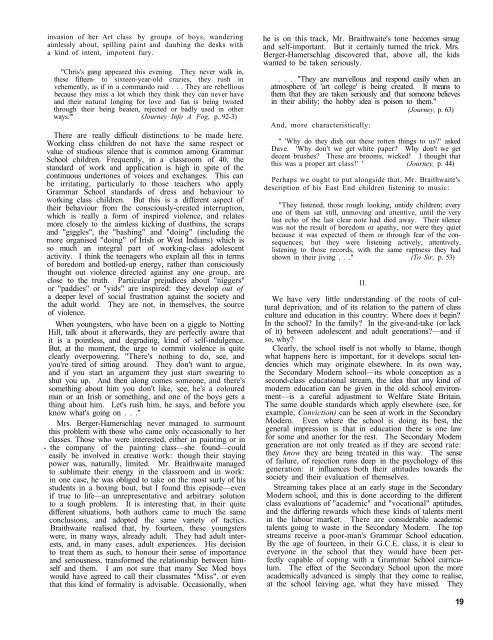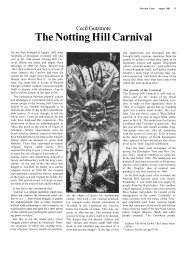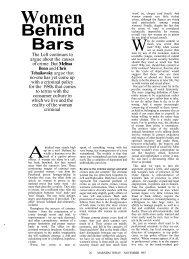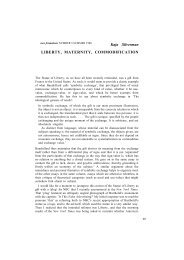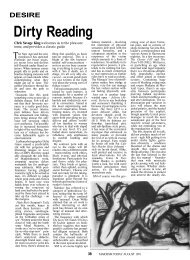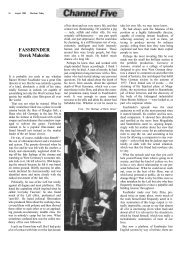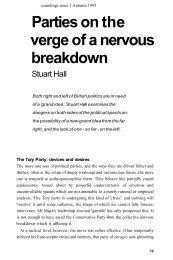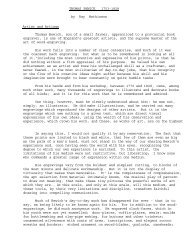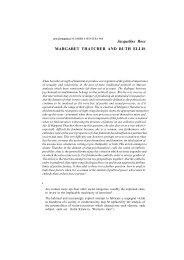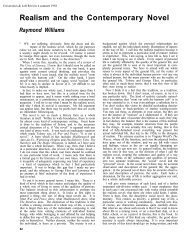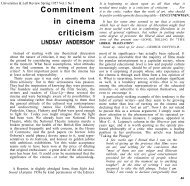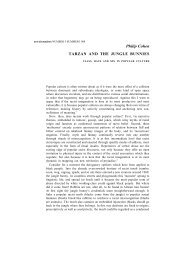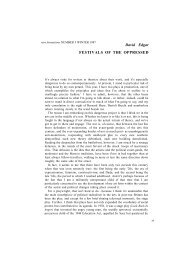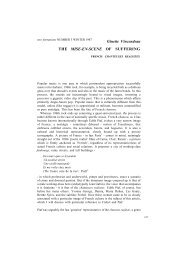Absolute Beginnings Stuart Hall
Absolute Beginnings Stuart Hall
Absolute Beginnings Stuart Hall
Create successful ePaper yourself
Turn your PDF publications into a flip-book with our unique Google optimized e-Paper software.
invasion of her Art class by groups of boys, wandering<br />
aimlessly about, spilling paint and daubing the desks with<br />
a kind of intent, impotent fury.<br />
"Chris's gang appeared this evening. They never walk in,<br />
these fifteen- to sixteen-year-old crazies, they rush in<br />
vehemently, as if in a commando raid . . . They are rebellious<br />
because they miss a lot which they think they can never have<br />
and their natural longing for love and fun is being twisted<br />
through their being beaten, rejected or badly used in other<br />
ways."' (Journey Info A Fog, p. 92-3)<br />
There are really difficult distinctions to be made here.<br />
Working class children do not have the same respect or<br />
value of studious silence that is common among Grammar<br />
School children. Frequently, in a classroom of 40, the<br />
standard of work and application is high in spite of the<br />
continuous undertones of voices and exchanges. This can<br />
be irritating, particularly to those teachers who apply<br />
Grammar School standards of dress and behaviour to<br />
working class children. But this is a different aspect of<br />
their behaviour from the consciously-created interruption,<br />
which is really a form of inspired violence, and relates<br />
more closely to the aimless kicking of dustbins, the scraps<br />
and "giggles", the "bashing" and "doing" (including the<br />
more organised "doing" of Irish or West Indians) which is<br />
so much an integral part of working-class adolescent<br />
activity. I think the teenagers who explain all this in terms<br />
of boredom and bottled-up energy, rather than consciously<br />
thought out violence directed against any one group, are<br />
close to the truth. Particular prejudices about "niggers"<br />
or "paddies" or "yids" are inspired: they develop out of<br />
a deeper level of social frustration against the society and<br />
the adult world. They are not, in themselves, the source<br />
of violence.<br />
When youngsters, who have been on a giggle to Notting<br />
Hill, talk about it afterwards, they are perfectly aware that<br />
it is a pointless, and degrading, kind of self-indulgence.<br />
But, at the moment, the urge to commit violence is quite<br />
clearly overpowering. "There's nothing to do, see, and<br />
you're tired of sitting around. They don't want to argue,<br />
and if you start an argument they just start swearing to<br />
shut you up. And then along comes someone, and there's<br />
something about him you don't like, see, he's a coloured<br />
man or an Irish or something, and one of the boys gets a<br />
thing about him. Let's rush him, he says, and before you<br />
know what's going on . . ."<br />
Mrs. Berger-Hamerschlag never managed to surmount<br />
this problem with those who came only occasionally to her<br />
classes. Those who were interested, either in painting or in<br />
- the company of the painting class—she found—could<br />
easily be involved in creative work: though their staying<br />
power was, naturally, limited. Mr. Braithwaite managed<br />
to sublimate their energy in the classroom and in work:<br />
in one case, he was obliged to take on the most surly of his<br />
students in a boxing bout, but I found this episode—even<br />
if true to life—an unrepresentative and arbitrary solution<br />
to a tough problem. It is interesting that, in their quite<br />
different situations, both authors came to much the same<br />
conclusions, and adopted the same variety of tactics.<br />
Braithwaite realised that, by fourteen, these youngsters<br />
were, in many ways, already adult. They had adult interests,<br />
and, in many cases, adult experiences. His decision<br />
to treat them as such, to honour their sense of importance<br />
and seriousness, transformed the relationship between himself<br />
and them. I am not sure that many Sec Mod boys<br />
would have agreed to call their classmates "Miss", or even<br />
that this kind of formality is advisable. Occasionally, when<br />
he is on this track, Mr. Braithwaite's tone becomes smug<br />
and self-important. But it certainly turned the trick. Mrs.<br />
Berger-Hamerschlag discovered that, above all, the kids<br />
wanted to be taken seriously.<br />
. . . "They are marvellous and respond easily when an<br />
atmosphere of 'art college' is being created. It means to<br />
them that they are taken seriously and that someone believes<br />
in their ability; the hobby idea is poison to them."<br />
(Journey, p. 63)<br />
And, more characteristically:<br />
" 'Why do they dish out these rotten things to us?' asked<br />
Dave. 'Why don't we get white paper? Why don't we get<br />
decent brushes? These are brooms, wicked! I thought that<br />
this was a proper art class!' ' (Journey, p. 44)<br />
Perhaps we ought to put alongside that, Mr. Braithwaite's<br />
description of his East End children listening to music:<br />
"They listened, those rough looking, untidy children; every<br />
one of them sat still, unmoving and attentive, until the very<br />
last echo of the last clear note had died away. Their silence<br />
was not the result of boredom or apathy, nor were they quiet<br />
because it was expected of them or through fear of the consequences;<br />
but they were listening actively, attentively,<br />
listening to those records, with the same raptness they had<br />
shown in their jiving . . ." (To Sir, p. 53)<br />
II.<br />
We have very little understanding of the roots of cultural<br />
deprivation, and of its relation to the pattern of class<br />
culture and education in this country. Where does it begin?<br />
In the school? In the family? In the give-and-take (or lack<br />
of it) between adolescent and adult generations?—and if<br />
so, why?<br />
Clearly, the school itself is not wholly to blame, though<br />
what happens here is important, for it develops social tendencies<br />
which may originate elsewhere. In its own way,<br />
the Secondary Modern school—its whole conception as a<br />
second-class educational stream, the idea that any kind of<br />
modern education can be given in the old school environment—is<br />
a careful adjustment to Welfare State Britain.<br />
The same double standards which apply elsewhere (see, for<br />
example, Conviction) can be seen at work in the Secondary<br />
Modern. Even where the school is doing its best, the<br />
general impression is that in education there is one law<br />
for some and another for the rest. The Secondary Modern<br />
generation are not only treated as if they are second rate:<br />
they know they are being treated in this way. The sense<br />
of failure, of rejection runs deep in the psychology of this<br />
generation: it influences both their attitudes towards the<br />
society and their evaluation of themselves.<br />
Streaming takes place at an early stage in the Secondary<br />
Modern school, and this is done according to the different<br />
class evaluations of "academic" and "vocational" aptitudes,<br />
and the differing rewards which these kinds of talents merit<br />
in the labour market. There are considerable academic<br />
talents going to waste in the Secondary Modern. The top<br />
streams receive a poor-man's Grammar School education.<br />
By the age of fourteen, in their G.C.E. class, it is clear to<br />
everyone in the school that they would have been perfectly<br />
capable of coping with a Grammar School curriculum.<br />
The effect of the Secondary School upon the more<br />
academically advanced is simply that they come to realise,<br />
at the school leaving age, what they have missed. They<br />
19


